
Solar Eclipse Safety Guidelines and Tips for April 8, 2024
A total solar eclipse is expected in the Laredo and Webb County area on April 8, 2024, between 12:00-3:00 p.m. Laredo ISD will provide an opportunity to participating secondary students to experience this once-in-a-lifetime event.
The following safety protocols and guidelines will be shared and implemented in order to prepare and closely monitor the safety of our students as well as staff during this historical event:
All District offices and campuses will be open to students, staff, and the community as a regularly scheduled school day. Therefore, all students and employees are to report to their campuses and/or departments as scheduled.
LISD elementary school students, grades PreK3-Grade 4, and staff will need to remain inside their classrooms during the eclipse. No outside activities or events, including recess, physical education activities, field trips, etc., are to be scheduled during the school day.
In-classroom lunches will be provided for all elementary students during this day.
A link will also be provided via the LISD Solar Eclipse Webpage so that students and staff can safely view the eclipse in their classrooms.
Science students in Grade 5 and under the supervision of their teachers may view the solar eclipse, provided they submit a signed parent permission form outlining the safety guidelines to be followed during the event. The permission form must be submitted to their teachers by no later than Friday, April 5, 2024.
Laredo ISD will provide middle and high school students with protective glasses, approved by the International Organization for Standardization (ISO), so that they may travel safely to and from their classrooms during this time period.
Middle and high school students may view the solar eclipse, provided they submit a signed parent permission form outlining the safety guidelines to be followed during the event. Signed permission forms must be submitted to their teachers by no later than Friday, April 5, 2024.
Staff that are not participating in the viewing of the Solar Eclipse are encouraged to remain indoors during this time period.
A link will also be provided via the LISD Solar Eclipse Webpage so that students and staff can safely view the eclipse in their classrooms.
All students will be dismissed at their regular dismissal times.
As always, safety remains a priority at LISD throughout all events and activities. Looking directly at the sun, even during the eclipse, can cause severe eye damage or permanent blindness. Therefore, LISD recommends following the Texas School Safety Center and NASA safety tips when observing a solar eclipse:
Use Solar Viewing Glasses:
Purchase special-purpose solar filters or solar viewing glasses that meet the ISO 12312-2 international safety standards. Ensure the glasses are not damaged, scratched, or punctured.
Solar Viewers and Filters:
Use solar viewers or filters designed for solar observation with telescopes, binoculars, or cameras. Ensure that the filters are securely attached to the front of optical devices.
Pinhole Projectors:
Create a pinhole projector, a simple and indirect method of viewing the eclipse. Do not look through the pinhole; instead, project the image onto a surface.
Solar Filters for Cameras:
If you plan to photograph the eclipse, use a solar filter designed for cameras to protect your eyes and avoid damaging your equipment.
Telescopes and Binoculars:
If using telescopes or binoculars, ensure they are equipped with solar filters for safe solar viewing.
Solar Eclipse Glasses for Children:
Ensure that children use solar eclipse glasses properly and supervise them during the observation.
Avoid DIY Solutions:
Do not use improvised filters, CDs, DVDs, sunglasses, or any other makeshift solutions, as they do not provide adequate protection.
Timing:
Only look directly at the sun during the brief moments of totality and use solar viewing protection before and after totality.
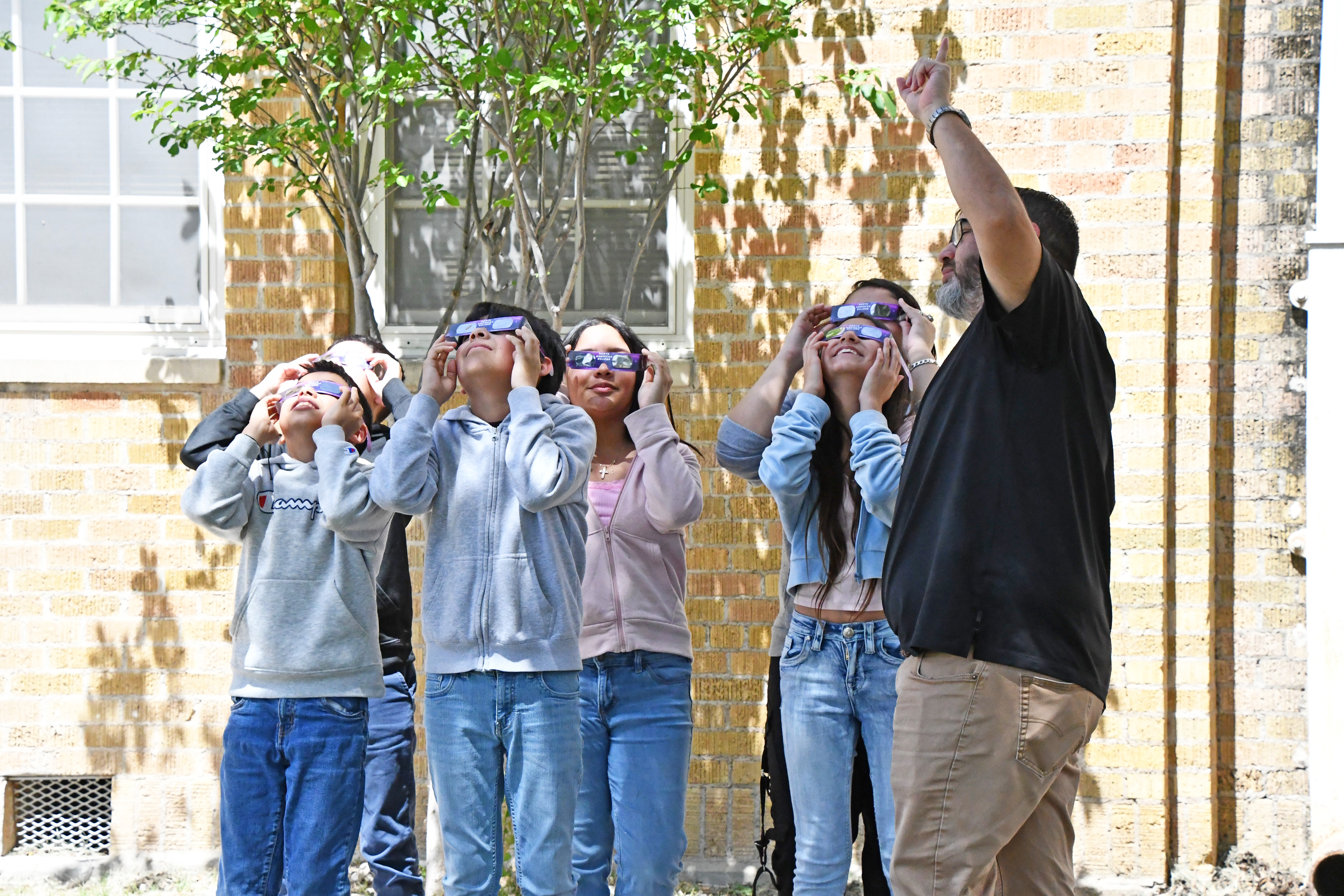
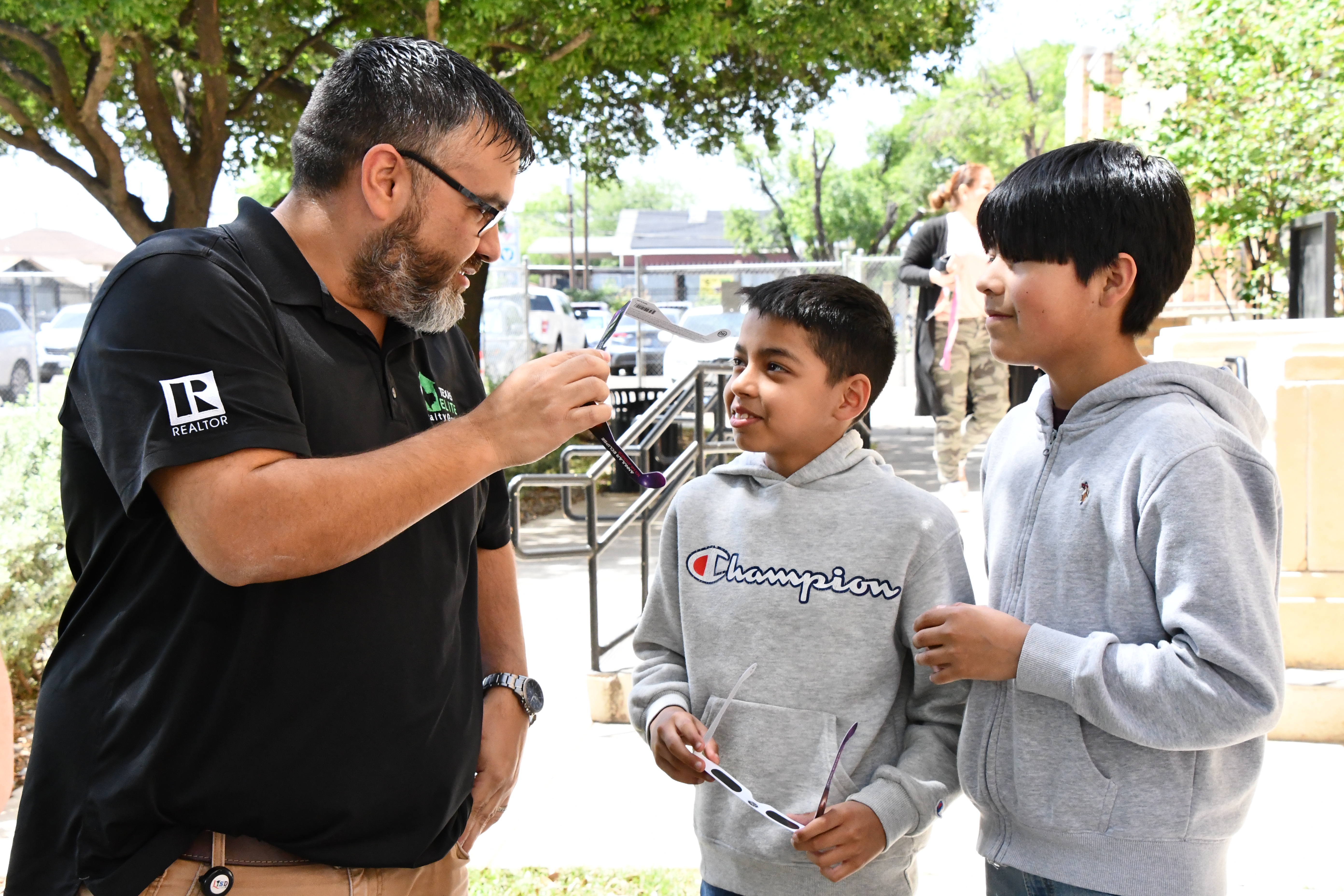
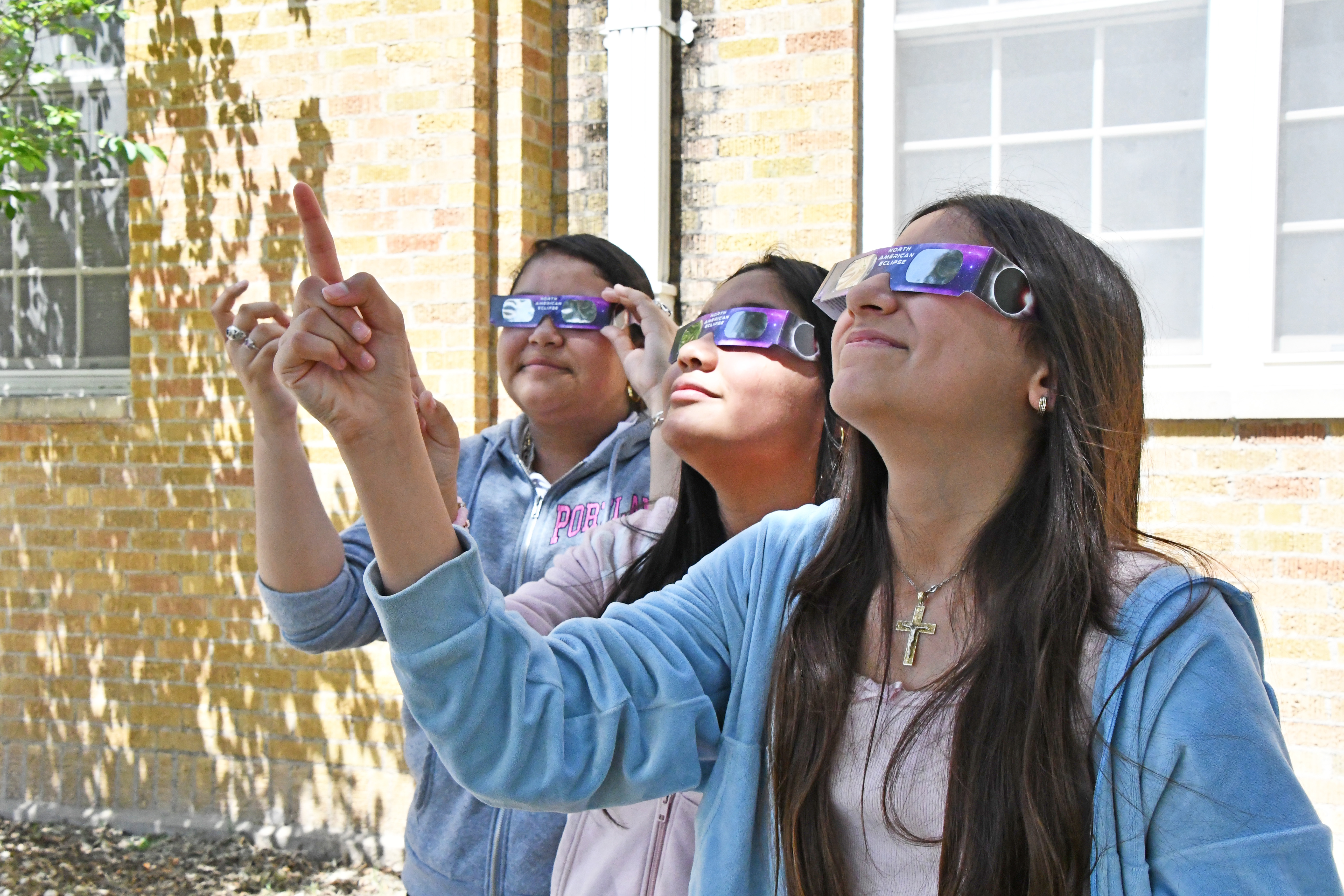
Feel free to call our Safety office at (956) 273-1010 for additional information. Working together, we can safeguard the health and safety of our LISD students and staff. Thank you.
NASA also offers the following safety guidelines and tips to follow during the solar eclipse:
• View the Sun through eclipse glasses or a handheld solar viewer during the partial eclipse phases before and after totality.
• You can view the eclipse directly without proper eye protection only when the Moon completely obscures the Sun’s bright face – during the brief and spectacular period known as totality. (You’ll know it’s safe when you can no longer see any part of the Sun through eclipse glasses or a solar viewer.)
• As soon as you see even a little bit of the bright Sun reappear after totality, immediately put your eclipse glasses back on or use a handheld solar viewer to look at the Sun.
• Do NOT use eclipse glasses or handheld viewers with cameras, binoculars, or telescopes. Those require different types of solar filters. When viewing the partial phases of the eclipse through cameras, binoculars, or telescopes equipped with proper solar filters, you do not need to wear eclipse glasses. (The solar filters do the same job as the eclipse glasses to protect your eyes.)
• Viewing any part of the bright Sun through a camera lens, binoculars, or a telescope without a special-purpose solar filter secured over the front of the optics will instantly cause severe eye injury.
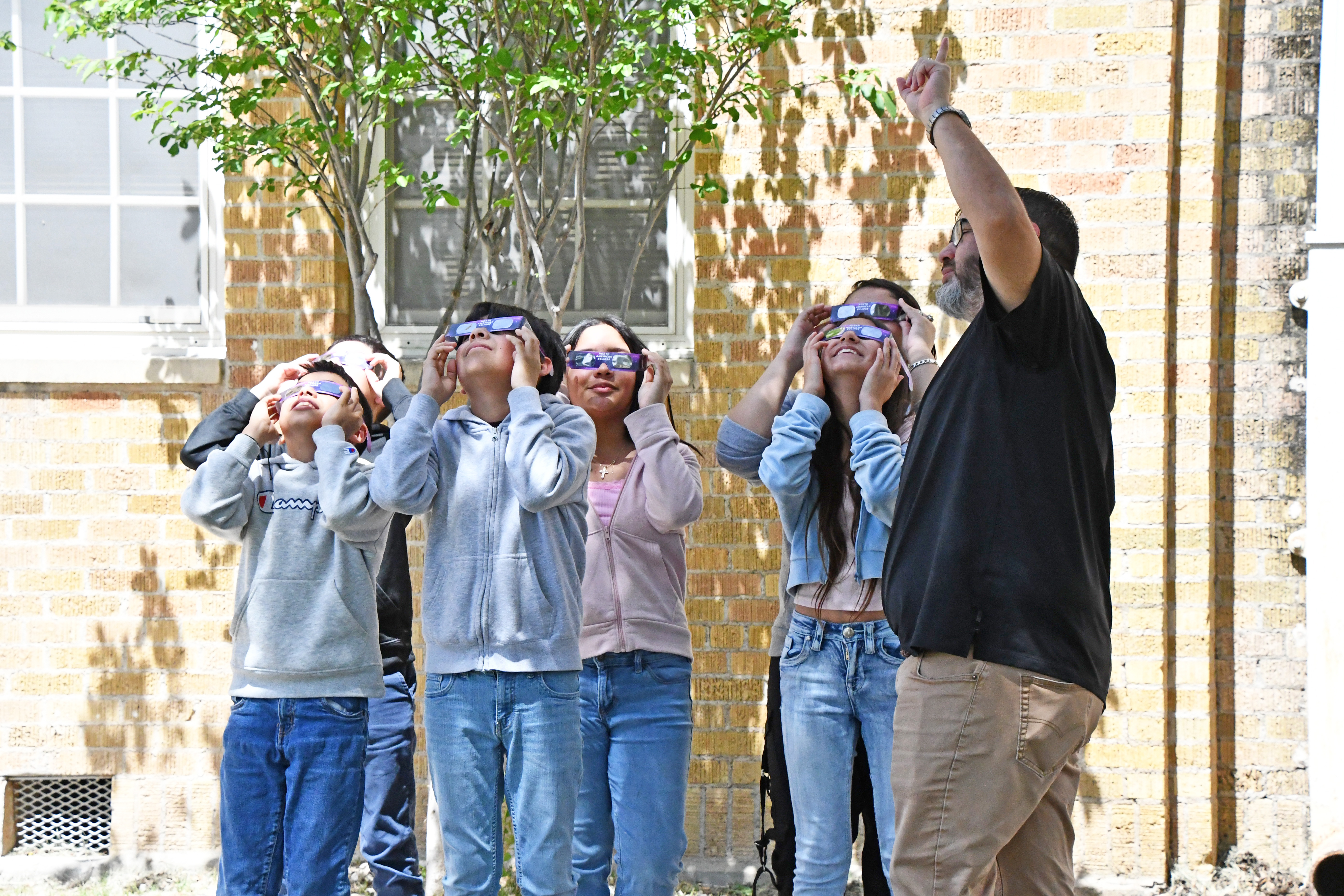
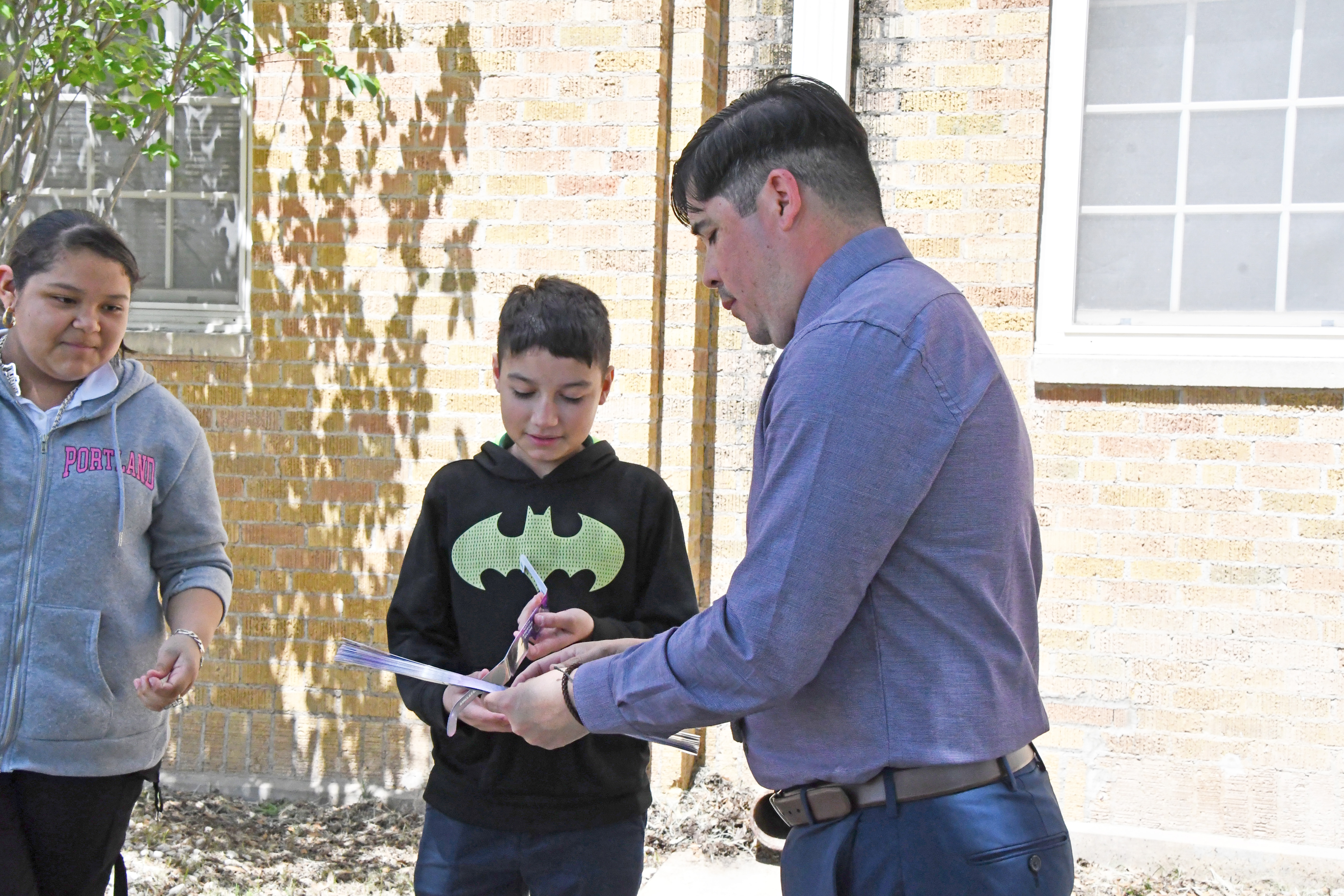
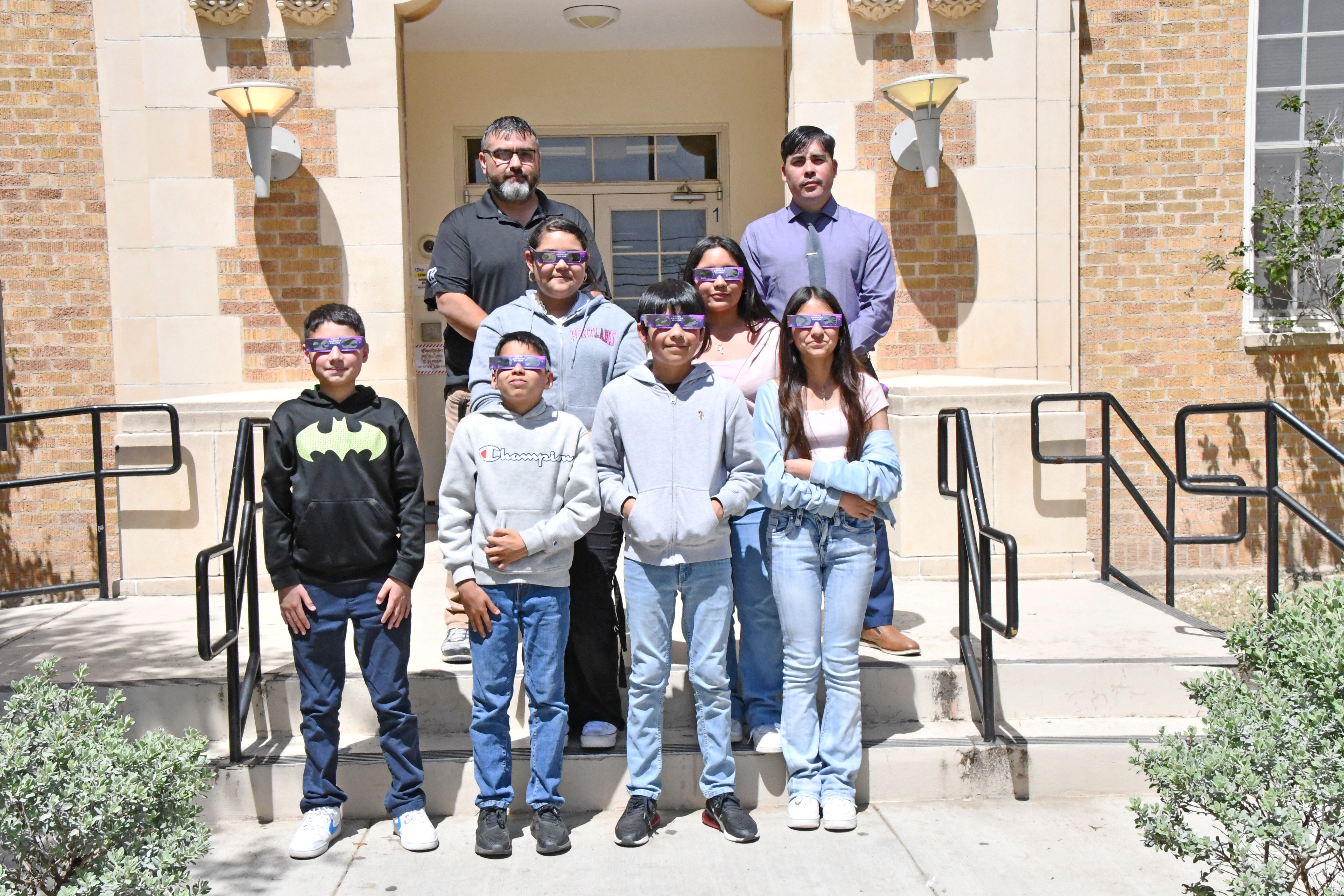
LISD middle and high school students to witness total solar eclipse
On April 8, most of South Texas will experience a total solar eclipse as the moon will appear to block the sun during a once-in-a-lifetime event. Laredo ISD middle and high school students will experience this exciting and memorable experience from their schools with LISD providing safe viewing glasses for this historical event.
The LISD Science Department is working to make the eclipse on April 8, a safe and experience for participating students. LISD was able to secure viewing glasses that are approved by the International Organization for Standardization (ISO). With support from the Houston Museum of Natural Science in collaboration with Buc-ee’s, and LISD’s Federal Programs funding, LISD received ISO approved glasses for middle and high school students to safely view the eclipse. Participating students must have a signed permission form which outlines the safety guidelines to parents and guardians. LISD’s elementary school children will remain inside their classrooms during the eclipse.
LISD teachers have already been provided with safety precautions and lessons that include grade level appropriate material that students can engage with in the days leading up to the eclipse.
LISD Secondary Schools Science Dean Michael Guerra explains the types of lessons associated with the eclipse. “These activities include Interactive worksheets that allow students to better understand the positions of the Earth, Sun, and Moon during the eclipse; literacy connections that explore topics such as the significance of the eclipse within various world cultures (social studies), the types of calculations that are involved in predicting and understanding the occurrence of eclipses (math and science), and poetry and narrative texts inspired by solar phenomenon (reading),” Guerra said.
“An added component are educator resources that allow teachers to explore the eclipse at a deeper level so that they can answer any questions that students may have, as we expect them to be very excited and curious. All material will be in digital format so that students can have this is their Google Classroom and share with their families at home,” Guerra added.
Guerra, who is also an adjunct professor at TAMIU, explained that the eclipse begins on April 8, at 12:09 p.m., and is at its maximum at 1:29 p.m., ending at 2:51 p.m. The total duration is 2 hours and 42 minutes (students will be viewing 20 minutes before and after maximum).
Guerra and LISD Elementary School Science Dean Nidia Zamilpa are coordinating with teachers so that everyone is well versed with the guidelines in place. Safety remains a priority throughout all of LISD’s efforts.
